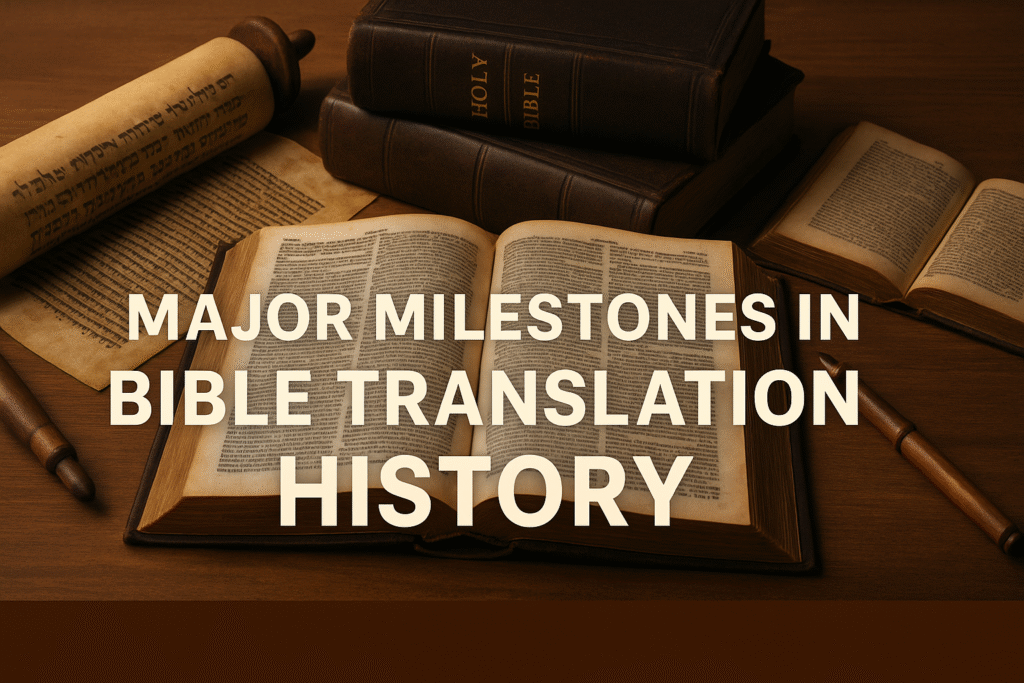The Bible has shaped nations, inspired art and literature, and impacted billions of people. Few people understand the incredible journey this sacred scripture has undergone, from Hebrew, Aramaic, and Greek manuscripts to the myriad modern translations we read today. The history of Bible translation is more than just a record of linguistic progress; it is a story of faith, courage, and God’s providence acting through translators throughout generations.
Understanding this history serves as a reminder to ministries, authors, and Christian media companies that language has always been one of God’s most effective instruments for communicating His Word. We continue this history at Christian Translation Ministry by providing high-quality translation, voice-over, and book localization services to help believers share the Gospel in every language.
The Early Foundations: From Scrolls to the Septuagint
The first significant milestone in Bible translation occurred long before the birth of Christ. As Jewish communities expanded across the Greek-speaking world, many people lost the ability to interpret Hebrew. Around the third century B.C., seventy scholars were claimed to have translated the Hebrew Scriptures into Greek, the version known today as the Septuagint.
This was a bridge of faith, not just a language project. The Septuagint enabled non-Hebrew speakers to encounter God’s Word, laying the path for the Gospel to spread among Gentiles during the New Testament period.
Preserving the Word: Latin and Early Vernacular Versions
As Christianity spread over the Roman Empire, Latin became the language of faith. In the fourth century, St. Jerome translated the Bible into Latin, resulting in the Vulgate, which shaped Western Christianity for almost a thousand years.
Later, devoted academics like John Wycliffe and William Tyndale risked their lives to translate Scripture into English so that common Christians could read it for themselves. Tyndale’s work served as the foundation for the King James Version, considered one of the most influential works of history.
These men recognized that translation is more than just a linguistic endeavor; it is a spiritual call. They exemplified the heart of all Christian translation ministries: making God’s Word available to everyone, regardless of language or status.
Global Expansion: Missionaries and Modern Languages
Another significant period in the history of Bible translation occurred throughout the 18th and 19th centuries. Missionaries from Europe and America spread both the Gospel and the printed Word to new regions. Translators such as William Carey in India and Adoniram Judson in Burma spent decades studying local languages, devising alphabets, and creating the first Bibles ever translated into their countries’ languages.
Their labor changed entire cultures. In many places, Bible translation sparked literacy drives, educational systems, and the preservation of native dialects. This era demonstrated that translation is more than simply words; it is about identity, culture, and transformation through Christ.
Technology and Teamwork: The Rise of Modern Bible Versions
The process of Bible translation has accelerated in the twentieth and twenty-first centuries through the use of digital tools, linguistic databases, and global collaboration. Today, ministries such as Wycliffe Bible Translators, YouVersion, and others have made Scripture available in thousands of languages, frequently quickly via smartphones.
At Christian Lingua, we share this spirit of creativity and cooperation. Through our Book Translation Services, media dubbing, and ASL interpretation, we assist Christian authors, filmmakers, and pastors in communicating biblical truth across cultural barriers, ensuring that the Gospel remains both timeless and relevant.
Why Bible Translation Still Matters Today
Even with thousands of translations available, many people around the world still have limited or no access to Scripture in their native language. The job continues, and every ministry, publisher, and believer can contribute.
Bible translation is more than just preserving history; it is also about carrying out the Great Commission. When a believer in Africa reads the Gospel in their native language, or a listener in the Middle East hears a Christian audiobook in their language, we see the living power of God’s Word transcending all borders.
Christian Lingua collaborates with ministries that share this mission to ensure that every individual, in every nation, encounters the truth of Scripture in terms they understand and love.
Continuing the Legacy
From parchment scrolls to digital apps, the tale of Bible translation demonstrates that God’s Word is unstoppable. It adapts, multiplies, and reaches hearts across all generations and languages.
At Christian Lingua, we are honored to carry on this precious work. Whether you’re a pastor preparing sermons for translation, a publisher expanding into new markets, or a filmmaker creating faith-based material, we can help you communicate your message to the globe with excellence and spiritual integrity.
Join us now in continuing the centuries-long heritage of spreading God’s Word to every tribe and tongue.
